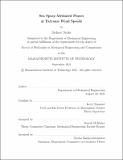Sea Spray-Mediated Fluxes at Extreme Wind Speeds
Author(s)
Sroka, Sydney
DownloadThesis PDF (6.133Mb)
Advisor
Emanuel, Kerry
Terms of use
Metadata
Show full item recordAbstract
Tropical cyclones are complex systems that are challenging to forecast and model. Since tropical cyclones are powered by the warm ocean surface, the accuracy of intensity forecasts depends heavily on the air-sea interaction scheme. However, at extreme wind speeds the air-sea transition layer becomes replete with sea spray such that there is no longer a well-defined interface. This means that the microphysics of sea spray plays a critical role in mediating the fluxes which control tropical cyclone intensity.
The first part of this thesis reviews and synthesizes results from the literature on parameterizations of air-sea enthalpy and momentum fluxes in tropical cyclones, with an emphasis on work that estimated the sea spray-mediated fluxes. The second part of this thesis analyzes the microphysical equations that describe how sea spray mediates enthalpy and momentum. An analysis of an ensemble of temperature, radius, and speed time histories of evaporating drops suggests that, for sufficiently high wind speeds, the formulation for air-sea exchange can be substantially simplified. The third part of this thesis describes the results from multiphase, direct numerical simulations of the sea surface subject to a large wind stress. The preliminary results suggest that the simulated vertical transport of liquid water is comparable to the expected volume flux, which is an encouraging outcome for the prospect of being able to supplement sparse observations of sea spray with numerical simulations. Finally, the fourth part of this thesis analyzes the turbulent air-sea heat flux over ocean mesoscale eddies in reanalysis data to determine whether persistent sea surface temperature perturbations have a significant effect on the time-averaged turbulent heat flux. The findings show that the ocean mesoscale eddies have a small but detectable influence on the time-averaged turbulent heat flux in the reanalysis data.
This thesis explores how small-scale processes can project onto large-scale dynamics. For tropical cyclones in particular, as model resolution improves, previously unresolved mechanisms will come into focus and help illuminate the workings of these complex natural phenomena.
Date issued
2021-09Department
Massachusetts Institute of Technology. Department of Mechanical EngineeringPublisher
Massachusetts Institute of Technology